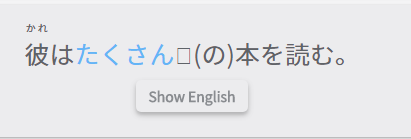Does 何も belong there in that sentence? Feels to me like it should be どうしても instead.
Wouldn’t that make it “no matter how, it cannot be destroyed” rather than “nothing can destroy it.”
I just did the lesson/grammar point for あげる in N5, and found two example sentences with grammar from N4. I sent error reports directly on the page, but I never know what happens with those and/or if they reach you all. So this is just further notice. (sentence #5 and #8)
I just did the lesson/grammar point for あげる in N5, and found two example sentences with grammar from N4. I sent error reports directly on the page, but I never know what happens with those and/or if they reach you all. So this is just further notice. (sentence #5 and #8)
The errors are fixed! 
Sorry for the inconvenience and thanks!
I thought I’d link to this post here, to make sure it comes to attention. 
@MissDagger Thank you for sharing the post above. We are looking into what might be causing the issue. Cheers!
@Kai Very mysterious indeed! All fixed. Thank you for pointing this out to us. Cheers!
For the sake of “textbook” correctness, shouldn’t this actually be 着られる since 着る is an ichidan verb? I realize though that ら抜き言葉 is a thing (for potential verbs, not passive verbs), and 着れる even has its own dictionary entry at jisho.org.
Still, I think it’d be better to only show [着る] as the hint, or maybe even [着る: Potential] and allow both 着られない and 着れない to be accepted in the answers.
Edit:
Wouldn’t 田代島には sound better here?
Also, 多い can’t be used directly with people; it needs to be 多くの人がいる instead. Makes me wonder if the same applies to other things that いる…
The alternative answers have been added.
We intended the sentence to be slangish, but forgot to add the proper grammatical, non-slangish answer 
Sorry for the inconvenience 
Wouldn’t 田代島 に は sound better here?
Also, 多い can’t be used directly with people; it needs to be 多くの人がいる instead. Makes me wonder if the same applies to other things that いる…
This is interesting topic 
It is not clear why, but 多い expresses only the amount but not attributes for some reason.
In other words, it cannot be used like a normal adjective to directly modify a noun, but only as predicate.
Normal adjective:
大きい車です。
車は大きいです。
Not normal and evil 多い:
車は多いです。 ✓
多い車です。X
There is an exception though - relative clauses.
猫が多い There are many cats.
猫が多いことから - from the fact that there are many cats
多い is not directly modifying こと, it is only a predicate of the relative clause.
So in other words:
You can say: 車が多い町 (city in which there are many cars)
but you cannot say: 多い町 X, in that case you have to use の noun - 多くの
Think of it as an exception.
Thanks for the breakdown!
It looks like proper usage of 多い could get its own grammar point here, haha.
(Edit: Possibly even ら抜き言葉 too, come to think of it. It’d be good to formally acknowledge the fact that it exists and is widely-used… I don’t believe my textbook even mentioned it.)
Actually this is a good idea. 
Added to the very long list 

The structure shows that this grammar can go directly after a verb, so I don’t see the purpose of nominalizing 始める in this sentence. Is the の necessary? Does it change the meaning?
Forum links from the grammar detail page don’t work. Clicking on the forum icon next to the “add note” field doesn’t do anything (Android, chrome)
Hey 
The sense is basically the same.
のにこしたことはない is technically grammatically correct but rarely used (especially in conversations).
So のless variant is more natural.
I have tweaked the example . 
Thank you for the feedback 
The usage of までに here should make the English say, “…contact me again by tomorrow.”
まで indicates the extent of a span of time, then the に following it means “at some point” within that span of time.
And you are right.
冬は休みのたびにスキーに行っています。
I go skiing every break in winter.
冬休みのたびにスキーに行っています。
I go skiing during the winter vacation every year.
The translation has been fixed 
It has been fixed!
Thanks 

Found this weird box on the N5 grammer point about たくさん






